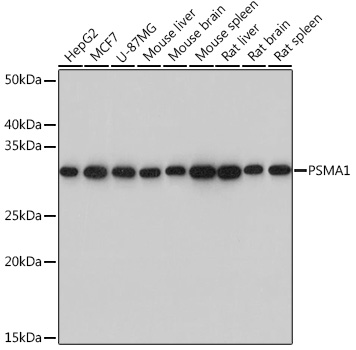Anti-PSMA1 Antibody (CAB3460)
- SKU:
- CAB3460
- Product type:
- Antibody
- Reactivity:
- Human
- Reactivity:
- Mouse
- Reactivity:
- Rat
- Host Species:
- Rabbit
- Isotype:
- IgG
- Research Area:
- Immunology
Description
| 抗体名: | Anti-PSMA1 Antibody |
| 抗体コード: | CAB3460 |
| 抗体サイズ: | 20uL, 50uL, 100uL |
| 申し込み: | WB IF |
| 反応性: | Human, Mouse, Rat |
| 宿主種: | Rabbit |
| 免疫原: | A synthesized peptide derived from human PSMA1 |
| 申し込み: | WB IF |
| 推奨希釈: | WB 1:500 - 1:2000 IF 1:50 - 1:200 |
| 反応性: | Human, Mouse, Rat |
| ポジティブサンプル: | HepG2, MCF7, U-87MG, Mouse liver, Mouse brain, Mouse spleen, Rat liver, Rat brain, Rat spleen |
| 免疫原: | A synthesized peptide derived from human PSMA1 |
| 精製方法: | Affinity purification |
| ストレージバッファ: | Store at -20'C. Avoid freeze / thaw cycles. Buffer: PBS with 0.02% sodium azide, 0.05% BSA, 50% glycerol, pH7.3. |
| アイソタイプ: | IgG |
| 順序: | Email for sequence |
| 遺伝子ID: | 5682 |
| Uniprot: | P25786 |
| セルラーロケーション: | |
| 計算された分子量: | 30kDa |
| 観察された分子量: | 30kDa |
| 同義語: | HC2, HEL-S-275, NU, PROS30 |
| バックグラウンド: | The proteasome is a multicatalytic proteinase complex with a highly ordered ring-shaped 20S core structure. The core structure is composed of 4 rings of 28 non-identical subunits; 2 rings are composed of 7 alpha subunits and 2 rings are composed of 7 beta subunits. Proteasomes are distributed throughout eukaryotic cells at a high concentration and cleave peptides in an ATP/ubiquitin-dependent process in a non-lysosomal pathway. An essential function of a modified proteasome, the immunoproteasome, is the processing of class I MHC peptides. This gene encodes a member of the peptidase T1A family, that is a 20S core alpha subunit. Alternative splicing results in multiple transcript variants encoding distinct isoforms.[provided by RefSeq, Jan 2009] |
| UniProt Protein Function: | PSMA1: The proteasome is a multicatalytic proteinase complex which is characterized by its ability to cleave peptides with Arg, Phe, Tyr, Leu, and Glu adjacent to the leaving group at neutral or slightly basic pH. The proteasome has an ATP-dependent proteolytic activity. Mediates the lipopolysaccharide-induced signal transduction in the macrophage proteasome. Might be involved in the anti-inflammatory response of macrophages during the interaction with C.albicans heat-inactivated cells. Belongs to the peptidase T1A family. 2 isoforms of the human protein are produced by alternative splicing. |
| UniProt Protein Details: | Protein type:EC 3.4.25.1; Protease; Proteasome complex Chromosomal Location of Human Ortholog: 11p15.1 Cellular Component: nucleoplasm; proteasome complex; polysome; proteasome core complex; centrosome; cytosol; nucleus Molecular Function:threonine endopeptidase activity; protein binding; RNA binding Biological Process: positive regulation of ubiquitin-protein ligase activity during mitotic cell cycle; negative regulation of ubiquitin-protein ligase activity during mitotic cell cycle; protein polyubiquitination; viral reproduction; apoptosis; antigen processing and presentation of exogenous peptide antigen via MHC class I, TAP-dependent; DNA damage response, signal transduction by p53 class mediator resulting in cell cycle arrest; regulation of apoptosis; antigen processing and presentation of peptide antigen via MHC class I; regulation of ubiquitin-protein ligase activity during mitotic cell cycle; anaphase-promoting complex-dependent proteasomal ubiquitin-dependent protein catabolic process; antigen processing and presentation of exogenous peptide antigen via MHC class I; gene expression; mitotic cell cycle; regulation of amino acid metabolic process; negative regulation of apoptosis; G1/S transition of mitotic cell cycle |
| NCBI Summary: | The proteasome is a multicatalytic proteinase complex with a highly ordered ring-shaped 20S core structure. The core structure is composed of 4 rings of 28 non-identical subunits; 2 rings are composed of 7 alpha subunits and 2 rings are composed of 7 beta subunits. Proteasomes are distributed throughout eukaryotic cells at a high concentration and cleave peptides in an ATP/ubiquitin-dependent process in a non-lysosomal pathway. An essential function of a modified proteasome, the immunoproteasome, is the processing of class I MHC peptides. This gene encodes a member of the peptidase T1A family, that is a 20S core alpha subunit. Alternative splicing results in multiple transcript variants encoding distinct isoforms.[provided by RefSeq, Jan 2009] |
| UniProt Code: | P25786 |
| NCBI GenInfo Identifier: | 130848 |
| NCBI Gene ID: | 5682 |
| NCBI Accession: | P25786.1 |
| UniProt Secondary Accession: | P25786,Q53YE8, Q9BRV9, A8K400, |
| UniProt Related Accession: | P25786 |
| Molecular Weight: | 263 |
| NCBI Full Name: | Proteasome subunit alpha type-1 |
| NCBI Synonym Full Names: | proteasome (prosome, macropain) subunit, alpha type, 1 |
| NCBI Official Symbol: | PSMA1 |
| NCBI Official Synonym Symbols: | NU; HC2; PROS30; HEL-S-275 |
| NCBI Protein Information: | proteasome subunit alpha type-1; PROS-30; protein P30-33K; proteasome nu chain; macropain subunit C2; macropain subunit nu; proteasome subunit nu; 30 kDa prosomal protein; proteasome component C2; proteasome subunit, alpha-type, 1; epididymis secretory pr |
| UniProt Protein Name: | Proteasome subunit alpha type-1 |
| UniProt Synonym Protein Names: | 30 kDa prosomal protein; PROS-30; Macropain subunit C2; Multicatalytic endopeptidase complex subunit C2; Proteasome component C2; Proteasome nu chain |
| Protein Family: | Proteasome |
| UniProt Gene Name: | PSMA1 |
| UniProt Entry Name: | PSA1_HUMAN |


